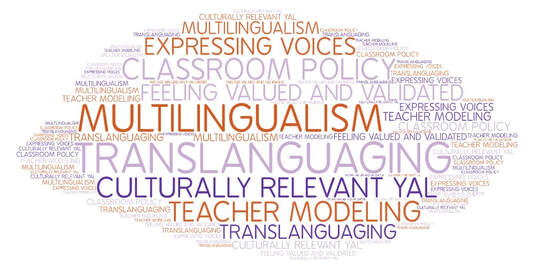BY EUN YOUNG YEOM
Using YAL to include emergent bilinguals’ voices
Reading young adult literature (YAL) can be very beneficial for secondary-level students and can operate as a powerful context for discussing complex social issues relevant to students’ lives and current society. Reading and discussing YAL can expand students’ horizons and their conceptions of themselves. The benefits of reading and discussing YAL could also be applied to English learning emergent bilingual adolescents. Recent studies show that leveraging emergent bilinguals’ heritage languages as a scaffold can support English development. However, few educators and researchers discuss how secondary-level emergent bilinguals make sense of the world through reading and discussing YAL written in English, how responding to YAL can be a medium to amplify their voices, and how their heritage languages could be a steppingstone for them to immerse themselves into YAL texts. In many U.S. classrooms that are often dominated by standard English, emergent bilingual adolescents’ perspectives toward YAL and their conceptions of the world can easily be dismissed. One core reason could be that emergent bilinguals’ written and oral utterances, often expressed through developing English mixed with their heritage languages, might look different from standard English expression. However, emergent bilinguals make sense of the world through intermingling their heritage languages and English, a process called translanguaging. Using heritage languages can serve as a bridge for emergent bilinguals to make meaning of YAL texts written in English because translanguaging is a natural way in which bilinguals engage with the world. Through this lens, emergent bilinguals are seen as capable meaning makers with diverse cultural and linguistic repertoires, not as English learners with limited English proficiency who cannot form proper English sentences. Classroom language policy matters Taking advantage of their heritage languages for discussing YAL can open doors for emergent bilingual students to express their opinions easily, and to access their lived experiences and cultural values in relation to the YAL texts they are reading and discussing. For secondary ELA classrooms where many YAL texts are incorporated, allowing emergent bilingual students use of their heritage languages could be a first step toward including more of their voices in discussions. For written responses, opening translanguaging spaces for intermixing heritage languages and English could be another way to honor bilingual students' cultural and linguistic resources and expand their expression options. Ultimately, teachers’ efforts to create a more linguistically inclusive classroom environment can support emergent bilingual students’ active involvement in YAL reading and discussions and can enrich the breadth of ideas and interpretations made available to the classroom community. Teachers’ modeling of blending two languages to make meaning could also reap benefits.
Integrating culturally relevant YAL also matters
In addition to efforts toward linguistic inclusiveness through translanguaging practices, incorporating culturally relevant YAL is equally important. If emergent bilingual students have to sit in a classroom reading a novel written in a second language they have started learning, text analysis will take tremendous energy. If they also have to discuss the novel in the foreign language, they may not be able to fully express their thoughts and feelings, even when formulating insightful ideas in their heads. To make matters worse, if the novel is irrelevant to their lives and cultures, the hardship comes in a combo plate. Incorporating YAL texts that are relevant to emergent bilinguals’ lives is one of the choices teachers can make for emergent bilinguals to feel more included by seeing themselves in the stories they are reading. Emergent bilingual adolescents, who may feel marginalized due to languages, race, and their status as immigrants or refugees, need school to be a space where they feel valued and validated. They are an important part of the colorful fabric of U.S. classrooms, which have increasingly become linguistically diverse. By respecting emergent bilingual adolescents’ bilingual repertoires and honoring their cultural identities through culturally relevant YAL, ELA classrooms can become a welcoming, empowering space for emergent bilingual adolescents to express their feelings, thoughts, and perspectives. RESOURCES
Translanguaging Guides | CUNY-NYSIEB Recommended sites for finding culturally relevant YAL for emergent bilingual adolescents Immigration and refugee experiences:
Asian immigrant experiences:
Latinx immigrant experiences African immigrant experiences: YAL about immigrants from the Middle East or Middle Eastern characters:
Eun Young Yeom was an in-service middle/high school English teacher in South Korea for 12 years, and is a doctoral student in the Department of Language and Literacy Education at the University of Georgia. Her research revolves around transnational emergent bilinguals’ language practices and their responses to young adult literature.
|
Authors:
|
CLA
About CLA
|
Journal of Children's Literature
Write for JCL
|
ResourcesCLA-sponsored NCTE Position Statements
|
Members-Only Content
CLA Video Library
|
© COPYRIGHT 2018.
ALL RIGHTS RESERVED |


 RSS Feed
RSS Feed